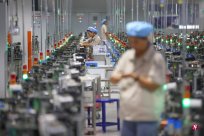Faced with strict epidemic prevention measures and the decline in the Chinese stock market under the property market, foreign investors' purchase scale this year has fallen to the lowest level of history.
According to Bloomberg, overseas investors have bought 87 billion yuan (S $ 16.818 billion) through Lugangtong Jingjing this year, about one -fifth of the total last year, and 2017Bloomberg began to organize the lowest level since the year's data.
In addition to the pessimistic emotions of the economy, the decline in the decline in overseas investors' interest in stocks in mainland China is also one of the reasons why global funds have withdrawn from China.force.However, the hope of the worst period may have been born. With the coexistence of Beijing learning with the virus and re -growth as the primary task, Wall Street optimism is re -ignited.
Wang Mingli, executive director of Shanghai Youpu Investment, said that the quiet buying of foreign capital this year may mean that under the dual booster of the acceleration of growth after the epidemic and the global policy tightening inflection point, the inflow of funds will accelerate next year.
In fact, the mood of foreign investors has improved significantly since last month. The shift of Chinese epidemic prevention policies and support for support for the real estate industry have strengthened the inflow of funds after promoting the strong rebound of the stock market.The relief of the tension between China and the United States is also helpful.
However, the Shanghai and Shenzhen 300 index that measures the large -cap stocks in mainland China fell about 21%this year, becoming one of the worst -benchmark stock indexes in the world, and it was also since Trump's trade war in Beijing in 2018The largest decline.
The so -called northern -directional capital flow flowing into the mainland stock market this year is significantly lower than the estimation of Goldman Sachs Group in August.At that time, due to the tightening of global liquidity and the depreciation of the renminbi, Goldman Sachs would be predicted that it would reduce two -thirds to $ 25 billion.
The bank said that the scale of capital inflows next year will rebound to US $ 65 billion (S $ 87.556 billion), which is slightly higher than the level of 2021; by 2030It will increase from less than 5%to 9%.
Foreign investors will also have a larger mainland stock trading pool, especially after regulators agree to further expand the scope of stock interconnection.
Since the launch of Shanghai -Hong Kong Stock Connect in 2014, stock interconnection has become the main channel for overseas investors to trade mainland stocks.In addition, overseas investors can also trades a series of domestic assets such as bonds and commodity futures through stocks with a history of 20 years of qualified foreign institutional investor mechanism.
Wang Mingli said that after the epidemic prevention and control caused the turbulent, people still hesitated to buy, but it is undeniable that Chinese assets are attractive and their fundamentals are attractive.


